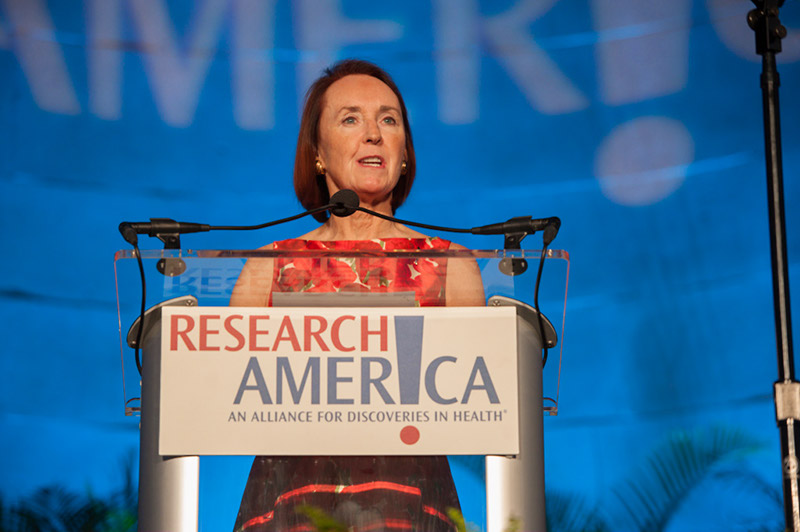It’s Never Over

Dear Research Advocate,
In concluding his 38-year tenure as Director of the NIAID, having served under seven presidents, Anthony Fauci, MD, offers his perspectives in the New England Journal of Medicine on his half-a-century of experience (so far!) as a physician-scientist. He describes the evolution since the 1960s in the public’s awareness of threats posed by new and emerging infectious diseases.
On this – World AIDS Day – his viewpoint is a timely reminder of the danger of complacency regarding future pandemics. As he notes of his early career, “the emergence of a truly new infectious disease [with pandemic potential]… was still a purely hypothetical concept. That all changed in the summer of 1981 with the recognition of the first cases of what would become known as AIDS.”
Thanks to significant scientific advances leading to new treatments, today more than 38 million people live with HIV – formerly a death sentence – though we have lost more than 40 million lives globally. More work lies ahead; with determination and support, there will be a vaccine one day. A born-and-bred New Yorker, Dr. Fauci cites Yogi Berra’s aphorism that “it ain’t over till it’s over,” adding “when it comes to emerging infectious diseases, it’s never over.”
On the Hill: The same reality – it’s never over – applies to the annual congressional appropriations process. Every year, Congress must determine what priorities to fund and at what levels. When Congress gets behind schedule, as has been the pattern in recent years, everyone feels the pain.
Extending FY22 funding into FY23, as we are doing now, means funding for the NIH, FDA, CDC, NSF, AHRQ, ARPA-H and other critical science and health agencies cannot get out in front of emerging infectious diseases and more. To boost medical progress, public health security, and other national strategic objectives, advocates must ensure our federal funding landscape reflects today’s priorities.
Please join (and share!) this sign-on letter (signature deadline is Monday, December 5) urging congressional leaders to complete the FY23 appropriations process – including boosting biomedical, health, and science research funding – without further delay.
Strengthening STEM Infrastructure: To improve the outcomes of our science and research ecosystem, it is essential for its workforce to reflect the diversity of our nation. Jasmine George, PhD, Research!America’s first Dr. Louis Sullivan Science Policy Fellow, has co-authored a Day One Project article making a compelling case for an inclusive, national STEM education program beginning at Pre-K. This timely and insightful read recommends changes to the existing landscape of federally funded STEM programs.
Upcoming Obesity Briefing: Register to join us on December 14 at 11 a.m. ET for a virtual briefing focused on new approaches to treating and living with obesity. Our moderator, Ken Thorpe, PhD, Chair of Health Policy & Management at Emory University, will be joined by a panel of experts to discuss recent research developments that address the comorbidities of obesity, including cardiovascular disease and diabetes, and advances that provide new tools and strategies for those living with this disease. Please come with questions for our interactive Q&A.
NIH ACD Meeting: The NIH Advisory Committee to the Director meeting takes place on December 8 and 9 and is open to the public. Participants will discuss updates on ARPA-H and COVID-19 working groups; and progress on implementation of NIH’s DEIA strategic plan, including an update on the UNITE initiative. You can register to attend in person, or livestream the meetings on NIH VideoCast.
#PHTYD Wrap-Up: Thank you for participating in the successful 2022 Public Health Thank You Day last week. In addition to bipartisan involvement from federal officials, 80+ state and local health departments from 33 states participated. The more than 1,400 #PHTYD Tweets generated over 9 million impressions – an expression of thanks to the many individuals who work tirelessly every day to protect the health of all people and communities.
Read a story about Pennsylvania health department leadership, who made a point of visiting locations across the Commonwealth in person on PHTYD. It’s just one example of the personal thanks inspired by the day.
ICYMI: This week we were joined by Emily Holubowich, National Senior Vice President of Federal Advocacy at the American Heart Association, for a conversation about legislative prospects as the 117th Congress comes to its end. Interested in the outlook for FY23 appropriations? Watch the recording.
Upcoming Alliance Discussion: Join us on Tuesday, December 6, at 2 p.m. ET for a conversation with Carolee Lee, CEO and founder of Women’s Health Access Matters. She will discuss topics such as the need for investment in women’s health research and the economic and health benefits to society of that investment.
Support Research Advocacy: Research!America is dedicated to increasing our nation’s investment in medical and health research. By making a gift to Research!America, you are strengthening our collective efforts to bolster public and private investment in scientific research and development to meet the challenges of the 21st century — climate change, the next pandemic, and more. Please consider making a gift today.




